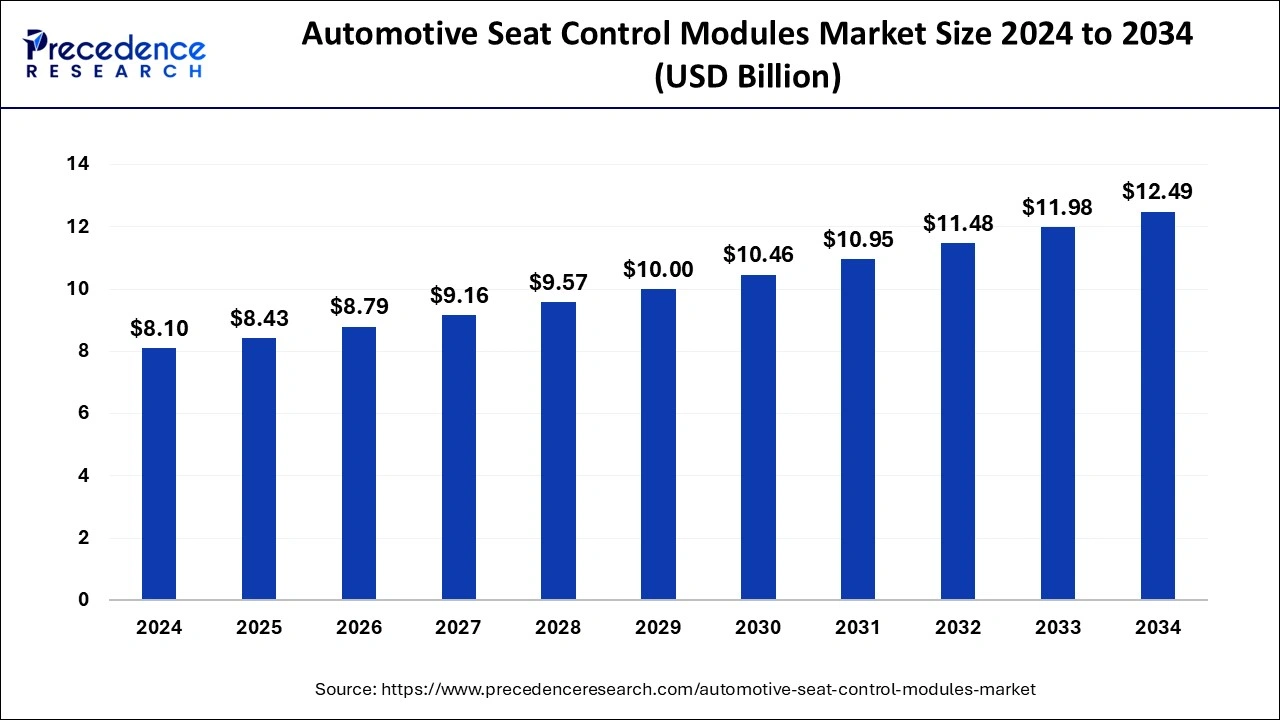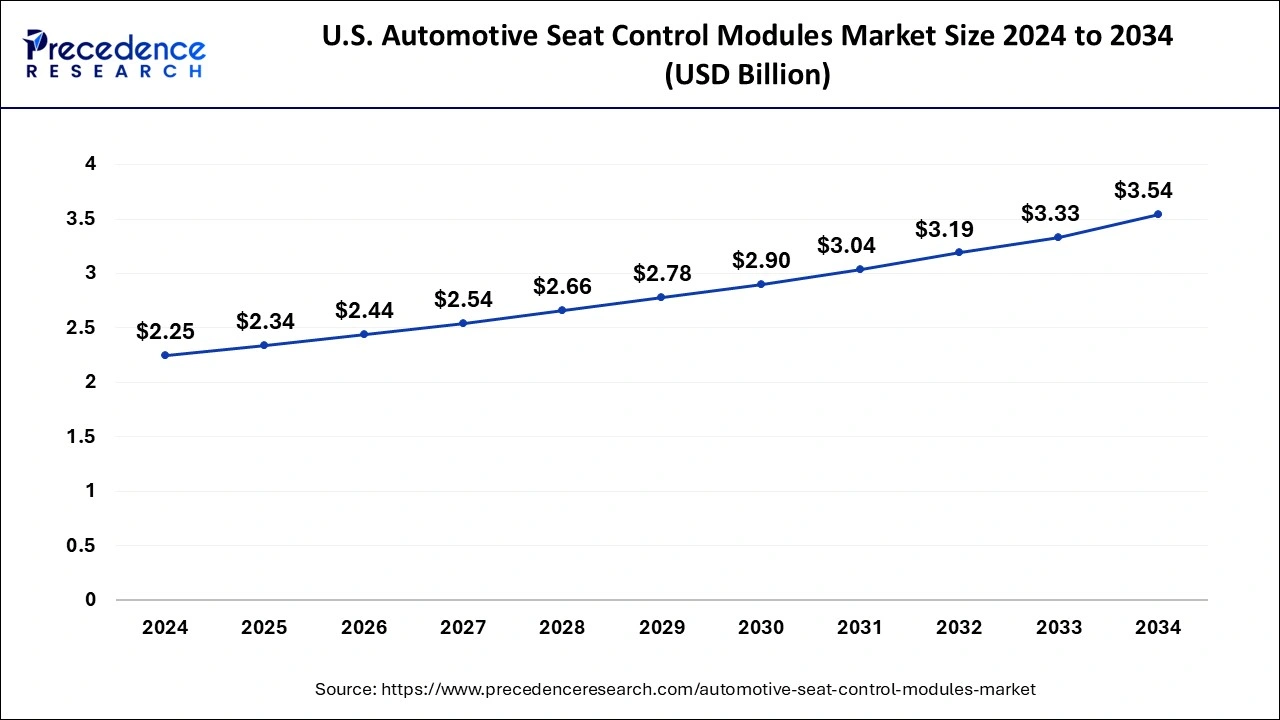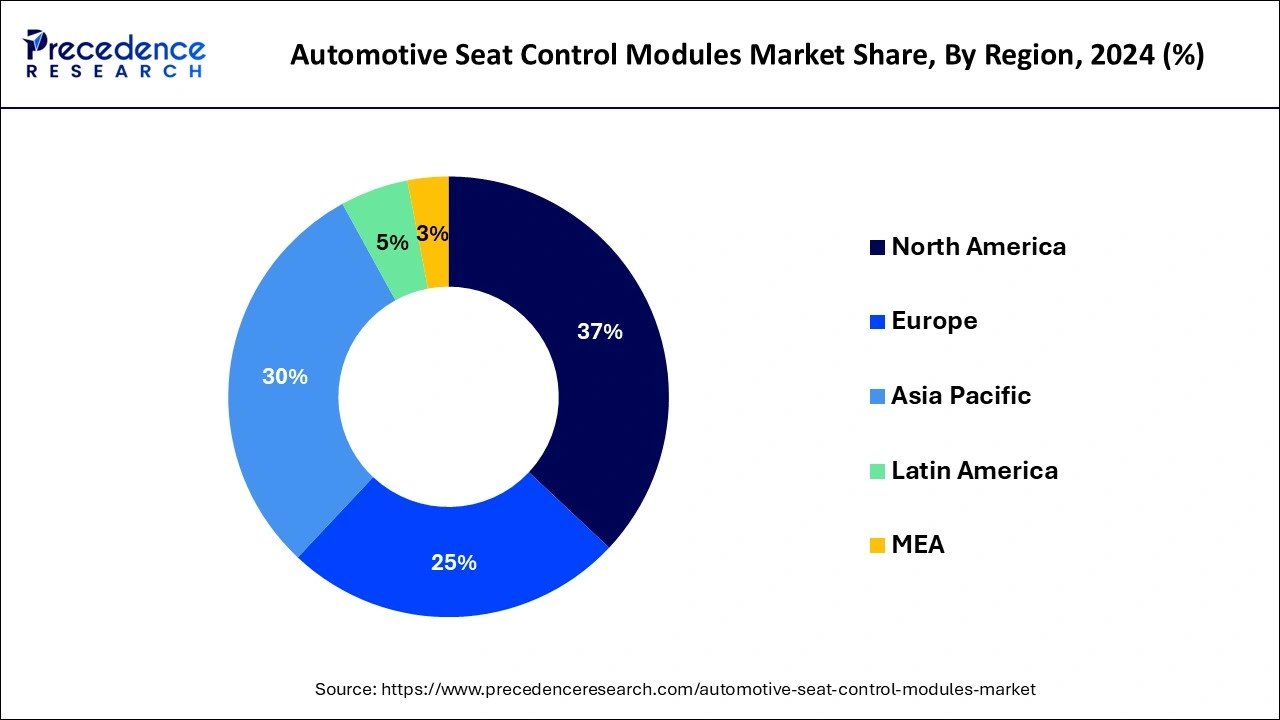What is the Automotive Seat Control Modules Market Size?
The global automotive seat control modules market size was estimated at USD 8.43 billion in 2025 and is predicted to increase from USD 8.79 billion in 2026 to approximately USD 12.99 billion by 2035, expanding at a CAGR of 4.42% from 2026 to 2035. The global automotive seat control modules market is attributed to the increasing trend of long-distance travel in developing regions due to the modernization of road networks and the integration of smartphones with seating systems.

Automotive Seat Control Modules Market Key Takeaways
- North America led the automotive seat control modules market with the largest market share of 37% in 2025.
- Asia Pacific is expected to grow at the fastest CAGR during the forecast period.
Market Overview
Seat control module highlights more on the safety, comfort and seat control system due to rapid progress of automobile sector and electronics technology. These factors gradually converted into imperative consideration for consumers appreciating automobile's comfort. Seat control module can regulate plentiful motors for correcting angle, location, and height of seat to permit drivers set their perfect driving position. The major influences that boost the growth of the automotive body control modules market are upsurge in need for advanced comfort, safety, and expediency features in vehicles; strict guidelines set by governments; and rise in requirement of automotive across the globe. Yet, growing complication is projected to confine the market growth to some extent. Furthermore, the demand for hybrid and electric vehicles and demand for advanced driver assist (ADAS) features are anticipated to deliver lucrative prospects for the development of the global automotive body control modules market during years to come.
How AI is Changing the Automotive Seat Control Modules Market
Artificial intelligence is a major and necessary trend in technology. AI-generated software of various companies provides the ideal solution to their customers. Manufacturers achieved exceptional speed and precision in identifying wrinkles across diverse seat materials, through advanced AI technologies. Various companies prioritize providing comprehensive training and exceptional customer support to ensure a seamless experience for their clients. In addition, AI technologies help to identify wrinkle defects and analyze seat materials with high precision. Companies propel their clients towards improved profitability and operational excellence, by empowering employees and automating quality inspection with advanced AI technology. These advanced trends are expected to enhance the growth of the automotive seat control modules market.
Automotive Seat Control Modules Market Growth Factors
- Snowballing body electronic functions in current vehicles
- Growing awareness associated to vehicle convenience and safety is accelerating the market
- Augmented production of trucks and economy class vehicles is pushing the growth of low-end body control modules
- Integration of smartphones with seating systems
- Increasing sale of luxury vehicles
- Growing after-market solutions for seat control
- Increasing preference of people for private cars
- Growing trend of long-distance travel in developing regions due to modernization of road network
Market Scope
| Report Highlights | Details |
| Market Size by 2035 | USD 12.99Billion |
| Market Size in 2025 | USD 8.43 Billion |
| Market Size in 2026 | USD 8.79 Billion |
| Growth RateFrom 2026 to 2035 | CAGR of 4.42% |
| Base year | 2025 |
| Forecast Period | 2026 to 2035 |
| Segments Covered | Type, Application, End User |
| Regional Scope | North America, Europe, Asia Pacific, Latin America, Middle East & Africa (MEA) |
Significant Market Trends
Passenger car is Predicted Grow at Rapid Pace During Years to Come
Among different types of vehicles, passenger car vehicles contributed biggest revenue in 2020. Each light-duty vehicle is mounted with a body control module for appropriate operations of other body control functions. OEMs are fine-tuning the seat control module for their individual vehicle models. Seeing the availability of customization in the vehicles, users are also enthusiastic to go for such vehicle offerings. This is the motive for the growth of the passenger vehicles market in across the globe.
Regioal Insights
What is the U.S. Automotive Seat Control Modules Market Size?
The U.S. automotive seat control modules market size was evaluated at USD 2.34 billion in 2025 and is predicted to be worth around USD 3.70 billion by 2035, rising at a CAGR of 4.69% from 2026 to 2035.

North America dominated the automotive seat control modules market with the largest market share of 37% in 2025. The market growth in the region is attributed to the increasing demand for passenger vehicles, increasing demand for comfortable and relaxed seating, and increasing consumer preference towards high-end vehicles.

The U.S. Automotive Seat Control Modules Market Trends
The U.S. dominated the automotive seat control modules industry in 2025. The market growth in the U.S. is attributed to the rising integration of IoT and AI to meet evolving consumer expectations and increasing focus on research and development. The market is experiencing growth in the U.S. To experience exceptional driving clubbed with advanced features, various consumers are demanding more lightweight vehicles. In addition, rising favorable government policies, technological advancements, and the increasing presence of mature offshore oil and gas fields driving the market growth.
Asia Pacific is expected to grow fastest during the forecast period.
The automotive seat control modules market growth is attributed to the increasing government initiatives to drive domestic oil and gas production and rapidly increasing energy demand driving offshore production and exploration activities.
China Automotive Seat Control Modules Market Trends
China is fastest fastest-growing country in the region and is expected to grow the fastest during the forecast period. The market growth in the country is attributed to the increasing popularity of electric vehicles and increasing focus on the production of lightweight materials and safety features. In addition, increasing urbanization and infrastructure development are owing to the increasing demand for transportation facilities in China. Furthermore, the increasing disposable income of more individuals is owing to their increased spending on premium products, such as automobiles in China. These factors are expected to drive the growth of the automotive seat control modules market in China.
Europe Accelerates Ahead in Automotive Body Control Modules Market Growth
Europe is anticipated to grow at a notable rate due to strong automotive manufacturing, rising adoption of advanced comfort and safety features, and strict vehicle safety regulations. Increasing demand for electric and hybrid vehicles, along with rapid integration of ADAS and smart electronics, is further boosting the adoption of automotive body control modules across the region.
UK Automotive Seat Control Modules Market Trends
The UK is anticipated to grow at a notable rate due to increasing adoption of advanced automotive electronics, rising demand for comfort and safety features, and a strong focus on electric and hybrid vehicles. Government support for vehicle electrification, growing integration of ADAS technologies, and continued innovation in automotive design and manufacturing are further driving market growth during the forecast period.
Middle East & Africa Drive Growth in Automotive Seat Control Module Market
The Middle East and Africa automotive seat control module market is growing due to rising vehicle sales, increasing preference for premium comfort features, and expanding urbanization. Growth in the luxury and SUV segments, improving automotive infrastructure, and gradual adoption of electric vehicles are further boosting demand for advanced seat control systems across the region.
UAE Automotive Seat Control Modules Market Trends
The UAE automotive seat control module market is growing due to strong demand for luxury vehicles, SUVs, and premium comfort features. Rising disposable income, increasing vehicle customization, and consumer preference for advanced safety and comfort technologies support adoption. Additionally, growing electric vehicle uptake and investments in smart mobility solutions are further driving demand for advanced automotive seat control systems.
Latin America Sees Rising Demand for Automotive Seat Control Modules
The Latin America automotive seat control module market is expanding due to growing vehicle production, increasing adoption of comfort and convenience features, and rising demand for mid-range and premium vehicles. Expanding urban populations, improving economic conditions, and gradual integration of advanced automotive electronics and safety technologies are further supporting market growth across the region.
Brazil Automotive Seat Control Modules Market Trends
Brazil's automotive seat control module market is expanding due to rising vehicle production, growing consumer demand for comfort and convenience features, and increasing adoption of advanced automotive electronics. Growth in the SUV and premium vehicle segments, along with gradual integration of safety technologies and improving economic conditions, is further supporting market expansion in the country.
Automotive Seat Control Modules Market Companies
The advent of new-fangled players is predictable to exaggerate competition amongst the existing players during the estimate period. Prominent market contributors are accenting on strategies such as innovative product launch, business development, collaborations and acquisition to withstand the strong market rivalry. Leading competitors contending in global automotive seat control modules market are as follows:
- Infineon Technologies AG: Provides automotive semiconductors, microcontrollers, sensors, and power management ICs used in seat control modules and other vehicle comfort and safety systems.
- Omron Corporation: Offers automotive control systems, sensors, switches, and electronic components that support seat adjustment, safety features, and vehicle automation.
- Pektron plc: Supplies custom electronic manufacturing services and automotive electronic modules, including control units and embedded systems for comfort and body control applications.
- Advanced Micro Electronics CO., Ltd: Develops automotive electronic components and microelectronic solutions, including control modules for seating, infotainment, and vehicle system integration.
Other Major Key Players
- Hella KGaAHueck& Co
- Delphi Automotive LLP
- Continental AG
- De Amertek Corporation
- Leopold Kostal GmbH & Co. KG
In order to better recognize the current status of acceptance of automotive seat control modules, and policies adopted by the foremost countries, Precedence Research foretold the future evolution of the automotive seat control modules market. This research study offers qualitative and quantitative insights on automotive seat control modules market and assessment of market size and growth trend for probable market segments.
Latest Announcements by Market Leaders
- In August 2023, Ford CEO Jim recently announced that Bosch should do the body control module, someone else to do the seat control module, and someone else to do the engine control module. They also said that they have 150 of these modules with semiconductors all through the car.
Recent Developments
- In April 2023, to offer comfortable seating services, Lear Corporation completed the acquisition of I.G. Bauerhin. The aim behind this launch was to help the company expand its presence in Germany.
- In June 2024, a highly anticipated SUV, the Bolero Neo Plus was introduced by Mahindra that promises versatility, comfort, and spaciousness for commercial use and families. This extended version of the popular Bolero Neo is set to redefine the concept of fully-family care, with seating for nine individuals.
Major Market Segments Covered
By Type
- Manual seat control module
- Memory seat control module
By End-User
- Passenger Car
- Commercial Vehicle
By Application
- Headrest positioning
- Climate based seating (heating, air conditioning and seat ventilation)
- Massage
- Seat adjustment (eight-way)
- Others
By Geography
- North America
- Europe
- Asia Pacific
- Latin America
- Middle East & Africa (MEA)
For inquiries regarding discounts, bulk purchases, or customization requests, please contact us at sales@precedenceresearch.com
Frequently Asked Questions
Ask For Sample
No cookie-cutter, only authentic analysis – take the 1st step to become a Precedence Research client
 Get a Sample
Get a Sample
 Table Of Content
Table Of Content




 sales@precedenceresearch.com
sales@precedenceresearch.com
 +1 804-441-9344
+1 804-441-9344
 Schedule a Meeting
Schedule a Meeting